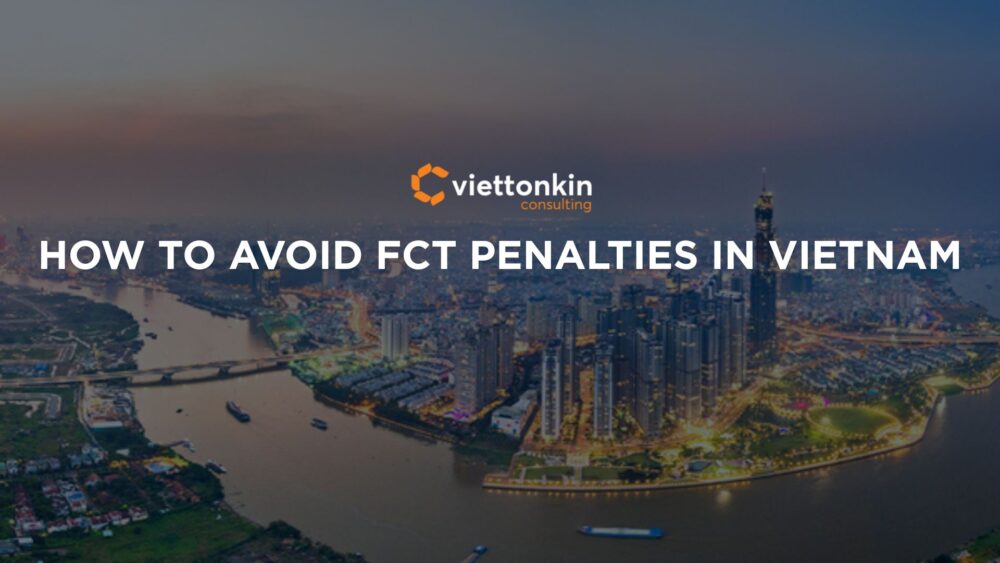From my perspective after 15 years on the ground, Vietnam's banking sector is undergoing a period of remarkable expansion, making it a focal point for global financial institutions from Southeast Asia and beyond. Reflecting the Vietnamese market's potential, the updated figures from the State Bank of Vietnam (March 30, 2025) show that the country's current […]
Ever wondered how one tax mistake can ruin your entire Vietnam market entry? For foreign contractors, getting FCT wrong can mean big fines, project delays and even blocked payments. It’s a make-or-break compliance issue.
There is significant risk around contractual obligations and tax compliance for foreign contractors, mismanaging FCT can have serious legal and financial consequences.
With over 20 years of experience guiding international companies through the investment landscapes of Vietnam, China and Malaysia, I’ve seen FCT trip up even the biggest players. Vietnam’s system is unique but with the right strategic insight it’s entirely manageable. My team and I specialise in helping companies structure their service contracts, licensing agreements and investments to avoid these surprises.
Key Takeaways
- What is it: FCT or Vietnam’s foreign contractor tax is not a single tax but a combination of Corporate Income Tax (CIT) and Value-Added Tax (VAT) applied to payments made to foreign entities for services or goods supplied in Vietnam.
- Who is responsible: The Vietnamese party making the payment is usually responsible for withholding tax and paying the FCT on behalf of the foreign contractor. Not all foreign contractors are subject to FCT—there are specific exemptions such as pure purchase contracts or services performed entirely outside Vietnam.
- Filing is key: There are three ways to comply with FCT—Direct (the foreign entity registers in Vietnam), Indirect (the Vietnamese party withholds tax) and Hybrid. The indirect method is the most common.
- Rates vary widely: FCT rates are not flat. They depend on the transaction, CIT rates range from 0.1% to 10% and VAT rates from 0% to 5%.
- Strategy over reaction: Proactive contract structuring, effective use of Double Tax Agreements (DTAs) and managing Permanent Establishment (PE) risk can significantly reduce your FCT burden.
What is Foreign Contractor Tax and Who Must Pay It?

Before you can build a risk-proof strategy you need to understand the basics. Think of FCT as Vietnam’s mechanism to tax foreign companies, foreign company, and other foreign parties that generate income from the country without having a full legal presence here. These entities are subject to tax in Vietnam when conducting business activities, and FCT is a withholding tax.
What is FCT Made Up Of?
FCT is made up of several familiar components applied in a unique way, as regulated by Circular 103/2014/TT-BTC:
- Corporate Income Tax (CIT):
- Indirect Method (“deemed CIT”): Flat rates by service type (e.g., 5% services, 2% construction) on gross revenue (per §5, Circular 103/2014).
- Direct Method: Standard 20% CIT on net profit if the foreign contractor registers in Vietnam (per §4, Circular 103/2014). This is applied to the contractor’s taxable revenue or total taxable revenue depending on the tax calculation method and whether the contract is gross or net.
- Value-Added Tax (VAT):
- Indirect: Deemed VAT rates (0%–10%) per transaction category (per §2, Circular 103/2014).
- Direct: Standard 10% VAT on invoiced value, with input credits if registered (per §1, Circular 219/2013/TT-BTC). This is applied to the service or goods being supplied, and the Vietnamese party may be entitled to an allowable input credit for VAT paid under the direct method.
- Personal Income Tax (PIT):
- Applies only to individual foreign contractors at 20% flat on gross payment (per §3, Circular 103/2014). Personal Income Tax PIT is a key component of the foreign contractor withholding tax.
Any foreign organisation or individual—including foreign companies, foreign sub, foreign sub contractor, foreign party—doing business or earning income in Vietnam under a contract with Vietnamese entities is subject to FCT, regardless of whether they have a permanent establishment in the country. This includes a wide range of activities from consulting, technical support, processing contracts and use of raw materials to intellectual property licensing, equipment leasing, casino management services, interest royalties, ceding reinsurance abroad, and domestic exports. Associated services performed in Vietnam can affect tax liability, and the scope of FCT extends to both direct and indirect contractual arrangements.
Entities and Transactions That Fall Under FCT
According to Maison Office, a legal and office services firm, FCT applies whenever a foreign entity provides goods or services in Vietnam. In most cases the Vietnamese company that signs the contract becomes the withholding agent. It is their legal responsibility to declare and pay the FCT to the tax authorities before remitting the remaining payment to you, the foreign contractor.
In some cases, the foreign contractor may also be required to pay tax directly. Timely tax registration is essential for foreign contractors to ensure compliance with Vietnamese tax regulations. Managing tax liabilities and understanding the requirements for foreign contractor tax declaration are crucial for both parties.
Legal Basis and Key Circulars
The main regulation governing FCT is Circular 103/2014/TT-BTC. This is the foundation document that outlines the rates, methods and responsibilities, including the Vietnam accounting system as a compliance requirement. While this circular is the base, it’s important to stay up to date with related decrees and updates from the Ministry of Finance as Vietnam’s tax landscape is constantly evolving. As noted in a 2024 analysis by professional services firm Alvarez & Marsal, Vietnam is refining its corporate tax laws to align with international standards and national development goals.
Primary Legislation:
- Law on Tax Administration 2019 (Article 38): Sets withholding agent obligations.
- Law on CIT 2008 (amended 2013) & Law on VAT 2008 (amended 2013): Define tax bases.
Key Implementing Circulars:
- Circular 103/2014/TT-BTC: FCT rates, methods, withholding responsibilities.
- Circular 219/2013/TT-BTC: VAT registration & credit rules.
- Circular 111/2013/TT-BTC: DTA application process for reduced withholding.
Exemptions and Special Cases
FCT Exemptions (Circular 103/2014):
Some transactions are exempt from FCT, such as pure purchase contracts and services performed entirely outside Vietnam, provided there are no associated services performed in Vietnam.
- Pure Goods Sale: Sale of goods alone (imported via customs)—taxed under import duties, not FCT (per §1.3).
- Offshore Services: Services performed entirely outside Vietnam, with no in-country component (per §1.4).
- DTA Relief: Reduced rates or exemptions per DTA—requires Certificate of Residence and pre-approval under Circular 111/2013. Tax treaties and the tax resident status of the foreign contractor can also affect FCT obligations and potentially reduce or eliminate withholding tax through double tax agreements.
FCT Tax Rates and Filing Requirements

This is where strategy comes in. The amount of FCT you owe depends entirely on the nature of your business activities, and how you file determines your administrative burden. The choice of tax calculation method—direct, indirect or hybrid—directly impacts the applicable tax rate for both VAT and CIT, as each method may result in different rates being applied to your transactions.
Common CIT and VAT Rates by Transaction Type
FCT is not a one-size-fits-all tax. The rates are applied to the gross revenue of the transaction and vary significantly:
| Transaction Type | CIT Rate (§5, Circular 103/2014) | VAT Rate (§2, Circular 103/2014) |
|---|---|---|
| General Services, Leasing Machinery | 5% | 5% |
| Construction (without materials supply) | 2% | 3% |
| Royalties & IP Licensing | 10% | N/A (Exempt) |
| Interest on Loans | 5% | N/A (Exempt) |
| Trading (Goods Distribution) | 1% | N/A (Exempt) |
Note: These are deemed rates for the indirect method.
Filing Methods & Agent Responsibilities
You have three main options for FCT Filing Options:
- Direct Method: Foreign contractor obtains Vietnam tax code, files monthly CIT & VAT returns via e-Tax system (per Decree 126/2020/ND-CP).
- Indirect (Withholding) Method: This is the most popular option. Vietnamese payer withholds CIT & VAT and remits monthly by the 20th—files Form 03/FCT (per Article 38, Law on Tax Administration).
- Hybrid Method: Foreign contractor self-declares VAT; Vietnamese payer withholds CIT portion only.
Declaration Methods for Foreign Contractor Tax
Choosing the right declaration method for foreign contractor tax (FCT) in Vietnam is a key step for foreign contractors to stay compliant and optimize their tax obligations. Vietnam’s tax regulations offer three main options: the direct method, the deduction method (also known as the withholding method) and the hybrid method. Each is designed for different business activities and levels of involvement in the Vietnamese market.
- Direct Method: Under the direct method, the foreign contractor registers with the Vietnamese tax authorities, gets a tax code and declares and pays FCT, including both corporate income tax and value added tax, themselves like a local company. This method is suitable for foreign contractors with a significant, ongoing presence in Vietnam or those who want full control over their tax filings. While it offers more transparency and the ability to claim allowable input VAT credits, it requires maintaining accounting records in accordance with the Vietnamese accounting system and can be more administrative.
- Deduction Method: The deduction method, also known as the withholding method, is the most common method for foreign contractors with short-term or project-based business activities. Here, the Vietnamese party withholds the foreign contractor tax from the payment to the foreign contractor and remits it to the tax authorities. This method is simpler for the foreign contractor as there is no need to register for a tax code or file returns directly. However, it offers less flexibility, and the foreign contractor cannot claim input VAT credits. It is suitable for foreign entities providing services or goods without establishing a permanent establishment in Vietnam.
- Hybrid Method: The hybrid method combines elements of both the direct and deduction methods. The foreign contractor registers for VAT in Vietnam and declares and pays VAT themselves while the Vietnamese party withholds and pays the corporate income tax portion. This method is suitable for foreign contractors who want to recover input VAT on local expenses but don’t want to handle the full administrative requirements of the direct method. The hybrid method is often used by foreign contractors involved in larger or more complex projects where VAT recovery can make a significant impact on the overall tax payable.
Choosing the Right Method: The choice between the direct, deduction and hybrid methods depends on the nature of your business activities, the duration and scale of your projects, and your willingness to engage with the Vietnamese accounting system. Foreign contractors should assess their operational footprint and consult with local tax advisors to ensure they declare foreign contractor tax using the most efficient and compliant method. Stay informed about tax regulations and keep clear documentation to avoid penalties and ensure smooth business operations in Vietnam.
How to Manage FCT Exposure Using the Deduction Method
You can’t avoid FCT, but you can certainly manage it. This is where a proactive approach turns a potential liability into a predictable cost of doing business.
Optimize Contract Structure to Minimize FCT Burden

How you write your contract is your first and best line of defense.
- Split Invoices: If your contract involves both goods and services, structure it so they are clearly separated. Goods are generally not subject to FCT (they are handled by customs duties and import VAT), while services are. A single, blended price will likely result in FCT being applied to the entire contract value.
- Carve-Outs for Offshore Services: If portions of a service are performed entirely outside of Vietnam, document this in the contract. These offshore services may be exempt from FCT if structured correctly.
- Use of Local Subcontractors: Engage a local Vietnamese entity for onshore activities, and sometimes this can shift the direct tax burden, simplifying your own FCT position.
- Hybrid and Deduction Methods: Both the deduction and hybrid methods require foreign organizations to meet certain conditions, so ensure you meet the conditions related to both the deduction and hybrid method before applying these methods.
Apply Double Tax Agreements (DTAs)
Vietnam has DTAs with over 80 countries. These agreements are designed to avoid double taxation and reduce the risk of double taxation for foreign contractors by providing tax benefits such as reduced or exempted tax rates. DTAs can exempt you from paying the CIT portion of the FCT.
However, claiming this exemption requires precise execution. You must provide a Certificate of Residence from your home country’s tax authority, along with other required forms, to the Vietnamese tax office before payment is due. Simple mistakes, like a missing translation or a mismatched beneficiary name, can get your claim denied.
Structuring for Permanent Establishment (PE) Risk
A DTA can protect you from CIT, but only if you do not have a Permanent Establishment in Vietnam. You can trigger PE status through a fixed place of business, the presence of an agent who habitually concludes contracts on your behalf, or by providing services in-country for a certain duration (often 183 days). If you are deemed to have a PE, you lose your DTA protection and become subject to full Vietnamese CIT on your profits. This is a critical risk to manage from day one.
Common Mistakes That Trigger FCT Penalties
I see the same mistakes time and again. Avoiding these common traps is key to staying penalty-free.
- Common Penalty Triggers:
- Misclassification: Applying service CPT (5% CIT) when royalty (10%) should apply, leading to under-paid tax (per §5, Circular 103/2014).
- Late Withholding: Missing 10-day remittance deadline results in 0.03%/day late payment interest + 20% fine (per §22, Law on Tax Administration).
- Incomplete Filings: Wrong/missing Form 03/FCT results in administrative fines of VND 5–20 million (per §14, Circular 166/2013/TT-BTC).
- Stuck Funds: Banks block outward remittances without FCT tax receipts. This risk relating to overseas payment can be severe.
FCT Is Unavoidable—But Penalties Aren’t
Vietnam’s Foreign Contractor Tax system can seem like a major hurdle, but it is a predictable part of the landscape. With strategic planning and expert guidance, it becomes a manageable process rather than a source of risk.
Your success in Vietnam shouldn’t be compromised by tax compliance issues. By structuring contracts smartly, leveraging treaties correctly and ensuring meticulous filing you can unlock your growth potential with confidence. Don’t let tax mechanics derail your Vietnam opportunity—structure smart, file clean and scale fast.
You might also like: Company Formation in Vietnam: How to Set Up as a Foreigner, Structure, Cost, Timeline












